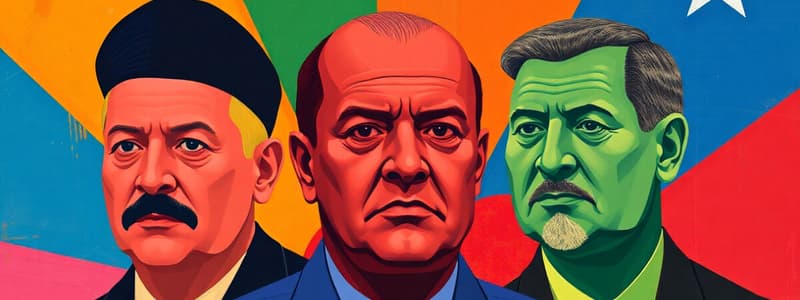Podcast
Questions and Answers
Which characteristic is most associated with authoritarian regimes that rule by one person?
Which characteristic is most associated with authoritarian regimes that rule by one person?
- Regular free elections
- Collective leadership
- Concentration of power (correct)
- Decentralized political power
What type of democracy does Lijphart associate with a homogeneous society?
What type of democracy does Lijphart associate with a homogeneous society?
- Centripetal democracy (correct)
- Consensus democracy
- Coalescent democracy
- Competitive democracy
Which of the following best defines hybrid regimes?
Which of the following best defines hybrid regimes?
- Authoritarian systems with occasional free elections
- Systems that are neither fully democratic nor fully dictatorial (correct)
- Strict totalitarian states with no civil liberties
- Fully democratic systems with regular elections
According to Lijphart's model, which type of democracy is characterized by elite behavior that is depoliticized?
According to Lijphart's model, which type of democracy is characterized by elite behavior that is depoliticized?
Which of the following statements about authoritarian regimes is false?
Which of the following statements about authoritarian regimes is false?
Which of the following types of regimes typically exemplifies rule by an organization rather than an individual?
Which of the following types of regimes typically exemplifies rule by an organization rather than an individual?
What challenge is commonly associated with defining hybrid regimes?
What challenge is commonly associated with defining hybrid regimes?
In Lijphart's classification of democracies, which of the following represents a characteristic of centrifugal democracy?
In Lijphart's classification of democracies, which of the following represents a characteristic of centrifugal democracy?
What aspect of power dynamics does the term 'consociational democracy' specifically highlight?
What aspect of power dynamics does the term 'consociational democracy' specifically highlight?
Which feature best differentiates totalitarian systems from authoritarian systems?
Which feature best differentiates totalitarian systems from authoritarian systems?
What distinguishes majoritarian democracies from consensus democracies according to Lijphart's framework?
What distinguishes majoritarian democracies from consensus democracies according to Lijphart's framework?
Which of the following best describes a characteristic of hybrid regimes?
Which of the following best describes a characteristic of hybrid regimes?
Which term is associated with the concept of a political landscape shaped by multiple groups with varying interests under a democratic system?
Which term is associated with the concept of a political landscape shaped by multiple groups with varying interests under a democratic system?
What is a potential issue when assessing the effectiveness of hybrid regimes?
What is a potential issue when assessing the effectiveness of hybrid regimes?
In the context of depoliticized elite behavior, which type of democracy is least likely to thrive?
In the context of depoliticized elite behavior, which type of democracy is least likely to thrive?
Flashcards
Authoritarian Regimes
Authoritarian Regimes
Systems of rule where power is concentrated in a single person or organization, often suppressing opposition and individual rights.
Democracies (Lijphart)
Democracies (Lijphart)
Different types of democracies exist classified by their structures and behaviours. These include majoritarian and consensus types.
Hybrid Regimes
Hybrid Regimes
Political systems that blend characteristics of authoritarianism and democracy; often lacking clear definitions and difficult to categorize.
Authoritarian Rule of One
Authoritarian Rule of One
Signup and view all the flashcards
Authoritarian Rule of an Organisation
Authoritarian Rule of an Organisation
Signup and view all the flashcards
Absolutist Monarchy
Absolutist Monarchy
Signup and view all the flashcards
Classic Dictators
Classic Dictators
Signup and view all the flashcards
Military Junta
Military Junta
Signup and view all the flashcards
One-Party State
One-Party State
Signup and view all the flashcards
Consociational Democracy
Consociational Democracy
Signup and view all the flashcards
Populist Presidents
Populist Presidents
Signup and view all the flashcards
Totalitarian vs. Authoritarian
Totalitarian vs. Authoritarian
Signup and view all the flashcards
Majoritarian Democracy
Majoritarian Democracy
Signup and view all the flashcards
Consensus Democracy
Consensus Democracy
Signup and view all the flashcards
Depoliticized Democracy
Depoliticized Democracy
Signup and view all the flashcards
Study Notes
Authoritarian Regimes
- Authoritarian regimes are systems of government characterized by a single ruler or organization holding power.
- Types of Authoritarian Regimes:
- Rule of one person:
- Absolutist monarchies (e.g., Saudi Arabia)
- Classic dictators (e.g., DPR Korea)
- "Populist" presidents (e.g., Venezuela)
- Rule of an organization:
- Military junta (e.g., Myanmar)
- One-party state (e.g., Cuba)
- Rule of one person:
- Authoritarian regimes often suppress opposition and limit individual freedoms.
Authoritarian Regimes (Continued)
- Ideology: Authoritarian regimes often utilize ideology to justify their rule.
- Religion: In some cases, religion plays a role in legitimizing authoritarian power structures.
- Emphasis on democracy: Some authoritarian regimes might use the notion of democracy as a tool to maintain control or to justify some aspects of their governance.
- Totalitarianism vs. Authoritarianism: Totalitarian regimes are distinct from authoritarian ones. They aim to control every aspect of life, while authoritarian regimes are more focused on political control.
Democracies
- Lijphart (1999) categorized democracies into:
- Majoritarian democracies
- Consensus democracies
- What is democracy? Defining democracy is complex, as the concept encompasses various aspects.
- Evolution of democracy: Historical processes that have formed democratic systems.
- Introduction of universal suffrage: Expanding voting rights to all citizens.
- Introduction of PR (Proportional Representation): A voting system that more directly mirrors the distribution of votes across political parties.
- Socialist participation in the government: Consideration about the role and influence of socialist ideals within democratic governance.
Democracies (Continued)
- Structure of the society: The structure of the society affects how political systems are developed and run by the elected leaders.
- Homogeneous: The society is composed of people with similar characteristics.
- Plural: The society is composed of diverse groups and interests.
- Depoliticized: Citizens are not actively involved in politics.
- Consociational: Different social groups have recognized roles in the government.
- Coalescent democracy: Institutions are formed to unite diverse groups and ideologies together.
- Centripetal democracy: The government functions to pull multiple different groups into a singular society and identity.
- Centrifugal democracy: The government functions to maintain separate identities and groups within society.
- Competitive: Many individuals and groups compete to obtain and exercise power in government.
- Lijphart, 1968: This work is important for understanding the classifications used in understanding and analyzing democracies.
Hybrid Regimes
- There's a lack of a universally accepted definition and approach when examining hybrid regimes.
- These regimes exhibit characteristics of both democracy and authoritarian rule. They are not entirely democratic nor entirely authoritarian.
- Problems to study these regimes:
- No uniform agreement on defining democracy
- Measurement/quantification struggles
- Political motivations of actors
Democracy Index 2020 (Global Map)
- The Economist Intelligence Unit produced a global map showing democracy across the globe.
- Regimes are categorized based on different levels of democracy:
- Full democracies
- Flawed democracies
- Hybrid regimes
- Authoritarian regimes.
- The map visually represents the state of democracy in different countries worldwide.
Studying That Suits You
Use AI to generate personalized quizzes and flashcards to suit your learning preferences.




